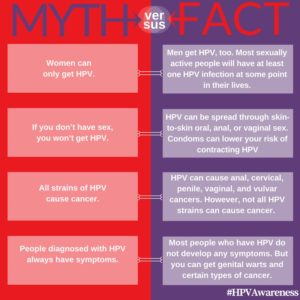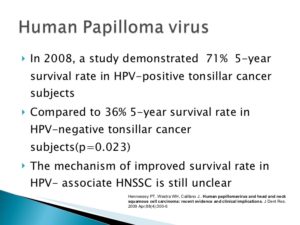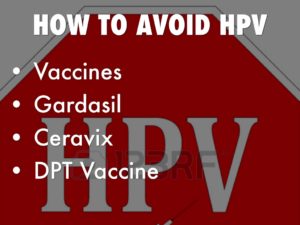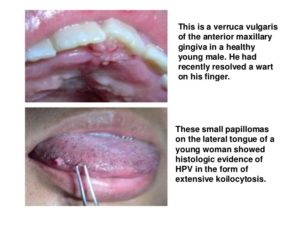



We see many commercials on TV lately that have adolescents or young adults talking about this disease. What is this abbreviation? Human Papillomavirus is its full name. About 79 million Americans are currently infected with HPV. About 14 million people become newly infected each year. HPV is so common that most sexually-active men and women will get at least one type of HPV at some point in their lives.
The CDC (Centers for disease control and prevention) states HPV is the most common sexually transmitted infection (STI), that it is a different virus than HIV and that HPV is so common that nearly all sexually active men and women get it at some point in their lives. CDC all states there are many different types of HPV, some types can cause health problems including genital warts and cancers but there are vaccines that can stop these health problems from happening=PREVENTION.
How is HPV is transmitted from one person to another?
It is a STD so you can get HPV by having vaginal, anal, or even oral sex with someone who has the virus. It is most commonly spread during vaginal or anal sex. HPV can be passed even when an infected person has no signs or symptoms.
Anyone who is sexually active can get HPV, even if you have had sex with only one person or multiple (obviously the more partners you have the higher the chance of getting it). You also can develop symptoms years after you have sex with someone who is infected unfortunately where this makes it hard to know when you first became infected.
What health risks does HPV put people at if they have this diagnosis?
In most cases, HPV goes away on its own and does not cause any health problems. But when HPV does not go away, it can cause health problems like genital warts and cancer.
Genital warts usually appear as a small bump or group of bumps in the genital area. They can be small or large, raised or flat, or shaped like a cauliflower. A healthcare provider can usually diagnose warts by looking at the genital area.
Remember it can cause the BIG C!
HPV can cause cervical and other cancers cancers including cancer of the vulva, vagina, penis, or anus. It can also cause cancer in the back of the throat, including the base of the tongue and tonsils.
Cancer often takes years, even decades, to develop after a person gets HPV. The types of HPV that can cause genital warts are not the same as the types of HPV that can cause cancers.
There is no way to know which people who have HPV will develop cancer or other health problems. People with weak immune systems (including individuals with HIV/AIDS) may be less able to fight off HPV and more likely to develop health problems from it.
How to avoid HPV and the health problems it can cause=PREVENTION, like almost every other disease.
You can do several things to lower your chances of getting HPV.
Get vaccinated. HPV vaccines are safe and effective. They can protect males and females against diseases (including cancers) caused by HPV when given in the recommended age groups (see “Who should get vaccinated?” below). HPV vaccines are given in three shots over six months; it is important to get all three doses.
Get screened for cervical cancer. Routine screening for women aged 21 to 65 years old can prevent cervical cancer.
For those sexually active do the following:
–The right way to do SAFE SEX is done the safe way everytime. This can lower your chances of getting HPV. But HPV can infect areas that are not covered by a condom – so condoms may not give full protection against getting HPV.
****Be in a mutually monogamous relationship – or have sex only with someone who only has sex with you; including have each sex partner checked for STDs before having sex with you monogamous or only partner.
******PREVENTION IS VACCINATION-The best way to prevent it !
All boys and girls ages 11 or 12 years should get vaccinated.
Catch-up vaccines are recommended for males through age 21 and for females through age 26, if they did not get vaccinated when they were younger.
The vaccine is also recommended for gay and bisexual men (or any man who has sex with a man) through age 26. It is also recommended for men and women with compromised immune systems (including people living with HIV/AIDS) through age 26, if they did not get fully vaccinated when they were younger.
How do I know if I have HPV?
ONE go to a doctor! Simply get tested and have the doctor examine your genital area.
Unfortunately there is no test to find out a person’s “HPV status.” Also, there is no approved HPV test to find HPV in the mouth or throat.
There are HPV tests that can be used to screen for cervical cancer. These tests are recommended for screening only in women age of 30 years or older. They are not recommended to screen men, adolescents, or women under the age of 30 years old.
Most people with HPV do not know they are infected and never develop symptoms or health problems from it. Some people find out they have HPV when they get genital warts. Women may find age 30 years and older when they get an abnormal Pap test result (during cervical cancer screening). Others may only find out once they’ve developed more serious problems from HPV, such as cancers.
Health problems related to having HPV:
Health problems related to HPV include genital warts and cervical cancer.
Genital warts: Before HPV vaccines were introduced, roughly 340,000 to 360,000 women and men were affected by genital warts caused by HPV every year.* Also, about one in 100 sexually active adults in the U.S. have genital warts at any given time.
Cervical cancer: More than 11,000 women in the United States get cervical cancer each year.
Every year approximately 17,600 women and 9,300 men are affected by cancers caused by HPV.
What happens if pregnant with HPV?
If you are pregnant and have HPV, you can get genital warts or develop abnormal cell changes on your cervix. Abnormal cell changes can be found with routine cervical cancer screening. You should get routine cervical cancer screening even when you are pregnant.
The Treatment for HPV:
There is no treatment for the virus itself. However, there are treatments for the health problems that HPV can cause:
- Genital warts can be treated by you or your physician. If left untreated, genital warts may go away, stay the same, or grow in size or number.
- Cervical precancer can be treated. Women who get routine Pap tests and follow up as needed can identify problems before cancer develops. Prevention is always better than treatment.
- Other HPV-related cancers are also more treatable when diagnosed and treated early like any other cancer.



